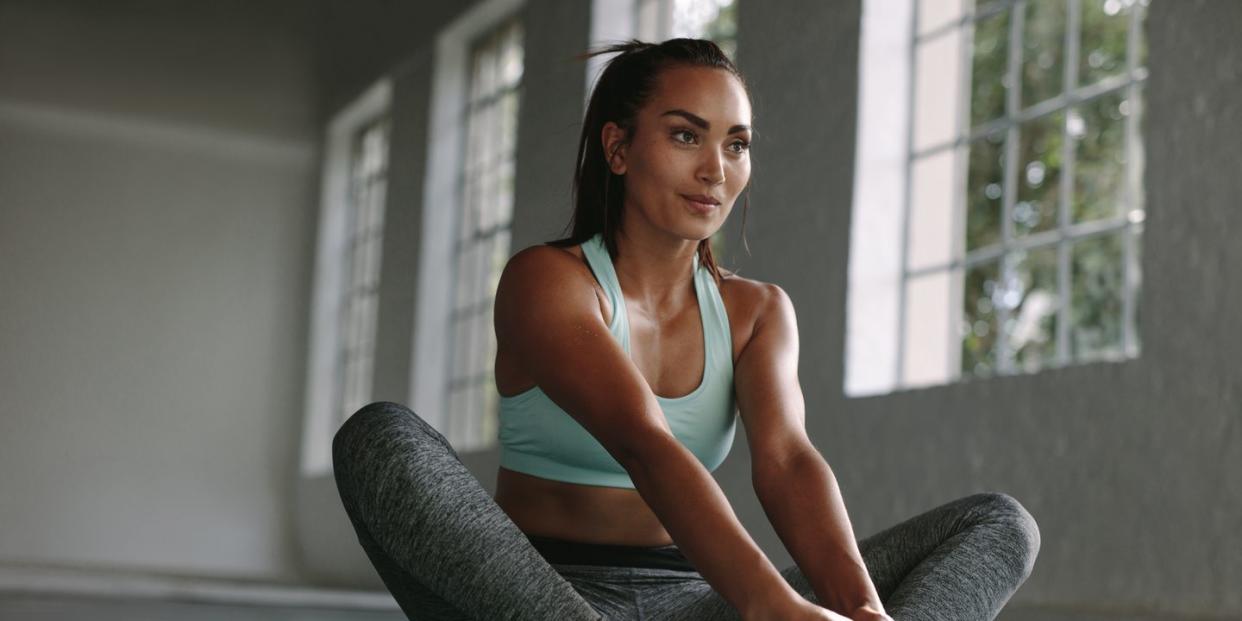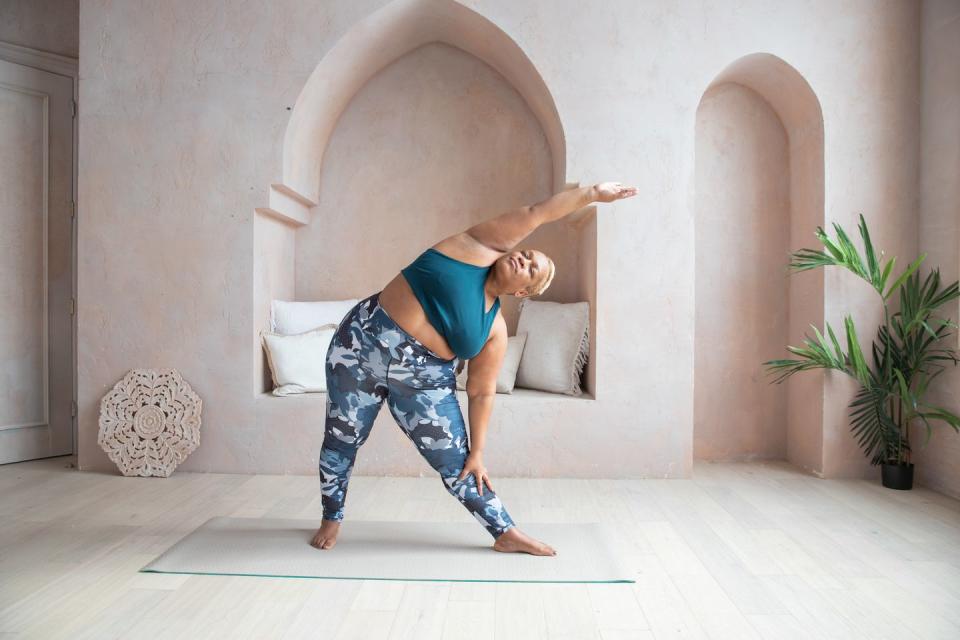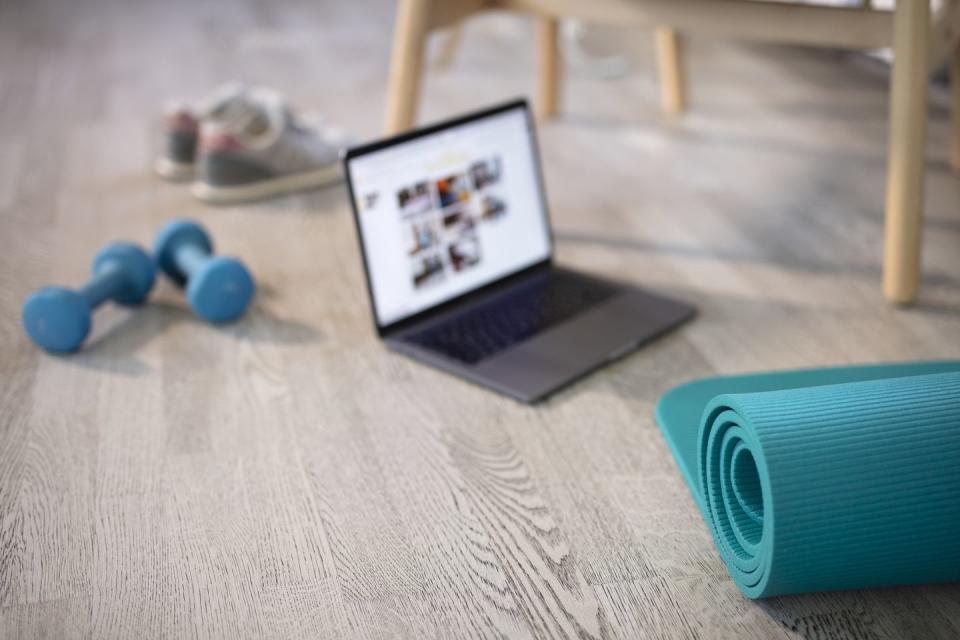12 surprising benefits of exercise that aren't weight loss

The benefits of exercise go way beyond simple weight loss. Shedding a few pounds may be the main reason you decide to start a new workout regimen, but there are myriad physical and psychological benefits that have very little to do with the numbers on your bathroom scales.
They say knowledge is power, and when it comes to workout motivation, the saying couldn't be more relevant. The more you know about the benefits of exercise, the more physical activity you're likely to get, according to a study from Central Queensland University. Simply reading about the benefits of exercise is beneficial.
So, next time you lace up your trainers, forget about burning calories and focus on what matters. From improving your mood to bolstering your bones, we asked personal trainer Laura Williams to talk us through the lesser-known benefits of exercise:
1. Healthy bones
Over time, regular weight-bearing exercise promotes bone formation and increases bone density, researchers at the University of Missouri-Columbia found. This includes day-to-day movements such as walking and stair-climbing, sports like tennis, and activities like running and jump training. 'Resistance training also helps to stimulate bone growth, as well as prevent bone loss,' says Williams.
✔️ Try this: Mix it up. Vary your weight-bearing activity so you're getting a rounded routine of walking, resistance training, agility and balance exercise – the latter can help to prevent falls, she says. 'Resistance training can be exercises using bodyweight moves,' Williams adds. 'It doesn't have to involve the gym or weights.'
2. Immunity boost
Exercise is seriously beneficial for a well-oiled immune system. In the short term, exercise helps your immune system find and deal with pathogens, analysis published in the journal Exercise Immunology Review found. In the long term, a regular workout slows down ageing-induced immune system changes, which reduces the risk of infections.
✔️ Try this: Go for a walk. Fitting in 30 to 60 minutes of near-daily brisk walking – equivalent to at least 3.5 miles per hour, or a 17-minute mile – makes your body extra-vigilant against pathogens by improving the way your white blood cells, circulatory system and tissues communicate with one another, according to a review published in the Journal of Sport and Health Science.
3. Improved mood
A cascade of mood-boosting hormones and neurotransmitters flood your brain when you exercise, including feel-good endorphins, the 'happy hormone' serotonin, and dopamine, which plays a role in reward and motivation. At the same time, your workout suppresses hormones that cause stress and anxiety.
✔️ Try this: Join an online class or partner up with a friend to maximise the feel-good factor of your workout, suggests Williams. Buddying up increases the amount of exercise you'll do, the University of Aberdeen found – especially if your gym buddy is emotionally supportive.

4. Increased energy levels
Feeling fatigued all the time? Exercise lifts you from a sloth-like state by improving your blood flow, which allows more oxygen and nutrients to reach your cells. Healthy-but-sedentary participants who engaged in 20 minutes of low-to-moderate intensity exercise just three times a week for six weeks found they felt less tired and more energetic, the University of Georgia found.
✔️ Try this: Focus on the less tough stuff. 'While varying your routine to include both high- and lower-intensity workouts is an essential game plan for ticking most goal boxes, when it comes to energy the consensus is that low-to-moderate is best,' says Williams. 'You'll get a good initial buzz from a high-octane session, but a lower intensity workout is less likely to leave you feeling depleted later on.'
5. Better sleep
Getting a solid night's kip is one of the most important things you can do for your health – more important than finishing that Netflix marathon. If you struggle to drift off, exercise is a simple, inexpensive, drug-free route to a better night's rest. People sleep significantly better and feel more alert during the day if they get at least 150 minutes of exercise a week, Oregon State University found.
✔️ Try this: Time your exercise right. 'This is really down to your own personal experience,' says Williams. 'If you find that home HIIT session leaves you wired at 11pm, try switching it to the morning.' Intense training is the only type of evening exercise that can negatively effect sleep, researchers at ETH Zurich found, so if you plan on going all-out, be sure to leave a few hours to recover before you hit the hay.
6. A great sex life
Getting a sweat on at the gym can improve your between-the-sheets action. It supercharges your self-esteem, boosts your circulation – vital for a healthy sex life – and crushes libido-killing stress. Men who exercise more have better erectile and sexual function, according to a study by Cedars-Sinai Medical Center. And among women, exercise itself can lead to an orgasm – sometimes called a coregasm, since it often occurs during abs workouts.
✔️ Try this: Don't neglect your pelvic floor. 'Pelvic floor exercises should form a crucial part of your fitness routine,' says Williams. 'Not only do strong pelvic floor muscles help to support everything from your weight training routine to a weak bladder, they also help to increase sensitivity and enhance orgasm during sex.'
7. Improved memory
Want to improve your memory? Get moving. Regular aerobic exercise – like running or cycling – increases the size of your hippocampus, the area of the brain responsible for verbal memory and learning, according to researchers at the University of British Columbia. So lace up your trainers and crank your podcast up.
✔️ Try this: Try and include short bursts of exercise wherever you can. Start your morning with a 15-minute walk around the block. Stand up where you can, or run up and down the stairs a few times every hour. Even a single 10-minute period of mild exertion can yield cognitive benefits, the University of California found.

8. Greater productivity
You'll also give your concentration levels and creativity a tangible boost by scheduling a workout into your day. In a study by Leeds Metropolitan University, workers had better time management, were more productive, and were more resilient and tolerant to co-workers on days they had been to the gym compared to the days they skipped their workout.
✔️ Try this: Split your daily exercise into bitesize chunks. 'If you can't get away from your desk long enough for a full workout, take mini breaks,' says Williams. 'The cumulative effects of taking the stairs several times a day, heading out to a sandwich bar that involves a longer walk and walking or part-walking your commute will offer similar benefits to that of a structured workout.'
9. Smoother skin
Your skin is your body's largest organ, so it makes sense that it would also stand to benefit from a solid workout routine. Exercise releases IL-15, a protein that interacts with the mitochondria in your cells to slow skin ageing, according to a study by McMaster University. It also stimulates the production of collagen, which gives your skin elasticity.
✔️ Try this: Safeguard your skin from sun damage when exercising outside. 'We all want the sun-kissed glow that comes from exercising outdoors – but to keep your skin in tip-top condition, SPF is a must,' says Williams. Use factor 15 as a minimum, taking care to appluy it to your face, neck, chest, arms and any other exposed areas.
10. Stronger muscles
By building stronger muscles, you won't just find everyday movements easier – you'll boost your heart health, improve your posture, and keep injuries at bay. You'll even reduce your risk of dying from cancer, the University of South Carolina found. Whether your muscle goal is a well-defined six pack or a little arm definition, you don't need to linger around the free weights area to see results.
✔️ Try this: Vary your exercise routine so that you're working your muscles in a variety of ways. 'Combine heavier-weight low-repetition sets with higher repetition sets,' says Williams. 'Add a different stimulus, such as a Swiss ball or suspension trainer to keep muscles on their toes.'
11. Chronic disease risk
Regular exercise reduces your risk of developing cancer, heart disease, dementia, stroke, type 2 diabetes, depression, obesity and high blood pressure, according to a review published in the International Journal of Clinical Practice. Apart from not smoking, being physically active is the most powerful lifestyle choice any individual can make to improve their health, the researchers concluded.
✔️ Try this: Set yourself a challenge. You could follow a couch-to-5k programme, aim to complete 10 push-ups in a row, or complete 100 air squats every day for 30 days. Once you've decided on your goal, map out how you'll get there and hold yourself accountable along the journey.
12. Live longer
People who exercise live longer. And not just a couple of months, either. By exercising for at least 150 minutes a week you could add a whopping seven years to your life, according to research published in the journal PLOS Medicine. Better yet, they'll be seven happy years. People who exercise report greater levels of excitement and enthusiasm, Penn State researchers found.
✔️ Try this: Make a training playlist. Playing high-tempo music while you workout increases the benefits of exercise for physical fitness and reduces the perceived effort involved, a study published in Frontiers in Psychology found. Avoid listening through your mobile if you can – talking or texting during exercise lowers the intensity of your workout and also affects your balance, Hiram College reported.
Last updated: 30-12-2020
You Might Also Like

